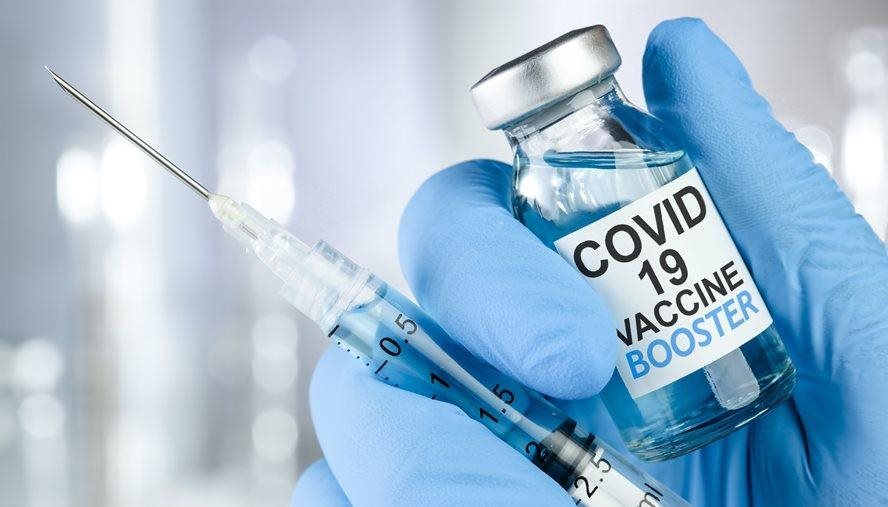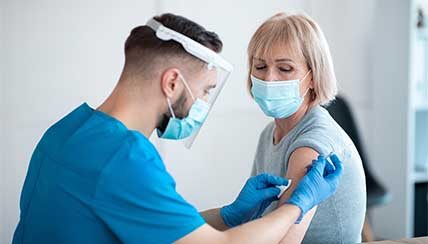“We’re going be stronger”:
A Frontline Physician’s View of COVID-19
Published April 23, 2020
“We are doing our best to give our patients the best chance to come out with a minor miracle,” Gabriel Lockhart, MD, critical care pulmonologist at National Jewish Health says of the work he and health care professionals across the country are facing during the COVID-19 pandemic.
We first looked into going into New York when they were really getting a shortage of physicians and nurses and respiratory therapists. With us being a leading respiratory institute in the nation, we really should have a hand in helping out in New York.
And, we have a great relationship with the Respiratory Institute at Mount Sinai, and we reached out and asked how can we help.
This was essentially my call to duty, this is my specialty, this is what I train for, and I was ready to enter that call.
The first New Yorker that we saw when we landed was our driver, and he was wearing a mask.
There was so much tension in the air that it was eye opening. It was the first introduction to, oh this is the real deal.
The majority of my ICU is full of patients infected with COVID. The vast majority were on the ventilator. It's tough on us when we are doing our best to give them the best chance to come out with a minor miracle, and when that doesn't happen, that tears us apart too.
It's heartbreaking to have not allow family members to physically come into the hospital. We have their loved ones on life support, and often are not suriving, and to not allow family members to come in and say their goodbyes, have their peace with the patient, that's absolutely heartbreaking.
We really don't let the patients die alone. We try to be at the bedside and give them a moment of peace when they do pass.
I believe that our medical providers have been so head first going into the battle of the hospital day, that you kind of forget what life was like before all this started.
There can be a cumulative effect over time where they're physically drained, mentally drained and emotionally drained. But, at the same time, there's a noticeable difference in how we're approaching these patients. And, we're gaining improvements, we're starting to see a little bit of light at the end of the tunnel that maybe we are starting to get a little bit of a noticeable benefit and progressing to overcoming this pandemic.
As the week went along, and I saw the human spirit of the physicians there, and saw how progress has been made from the medical community, it was almost like I awoke the next day feeling like the sun was shining a little bit stronger.
And, it felt like the optimism that I didn't realize wasn't there anymore had come back, and that soon we're going to be waking up and it's gonna be a sense of normalcy again. It will be sooner than we think.
Recently, Mount Sinai Hospital sent out a nationwide call for aid due to the surge in COVID-19 cases in New York City. National Jewish Health and Mount Sinai operate the Mount Sinai – National Jewish Health Respiratory Institute® in New York City. For leaders at National Jewish Health in Denver, it was an easy decision to provide help.
“It came to be that what they really needed was hands on deck,” Dr. Lockhart explains. “Within a couple of days, they moved mountains to get us out there very quickly.”
Dr. Lockhart and another critical care pulmonologist, Catherine Wittman, MD, were the first two National Jewish Health physicians who traveled to provide much-needed support. All of the doctors that have served in this capacity have volunteered for the assignment. “Honestly, I answered right away – yes, sign me up. This is my call to duty and what I train for. I was ready to answer that call,” Dr. Lockhart says.
Drs. Lockhart and Wittman could see the local impact of COVID-19 from the moment they landed. They were greeted by empty streets. “It was eye opening. It was our first introduction to ‘oh, this is the real deal.’” The radical introduction continued in the hotel as staff and visitors in masks attempted to maintain what social distance they could, given the city’s cramped quarters.
For the first day Dr. Lockhart shadowed in the Mount Sinai Intensive Care Unit (ICU), learning their COVID-19 treatment workflow and protocols. The following day he was on his own to lead an ICU team overseeing the care of extremely ill patients.
A majority of Dr. Lockhart’s patients were on ventilators and in isolated rooms. Movement in and out of patient rooms was restricted to only the medical team. Staff are forced to work with families remotely, preparing for difficult decisions about life support and life-saving measures they may need to make over the course of treatment.
At times, treating COVID-19 patients took a more emotional toll than physical. “It’s heartbreaking to not allow family members to physically come to the hospital. We have their loved ones who are on life support and who are often not surviving,” Dr. Lockhart explains. “We try to be at their bedside and give them a moment of peace when they do pass.”
Dr. Lockhart points out that not all cases end in tragedy. “There’s noticeable differences in how we’re approaching these patients. We’re getting improvements, and we’re starting to see a little bit of a light at the end of the tunnel. We are getting a bit of noticeable benefit, and we’re progressing to overcoming this pandemic.”
Currently, there is no approved treatment for COVID-19, but there are many drug trials in progress to find or create one or more. Dr. Lockhart was able to take part in some of those trials while at Mount Sinai, an experience he says gives him insight into how to treat patients in Denver. “We were able to establish drug trials of our own (in Denver) based on what we learned. This gave us a head start to get a protocol on treatments for when sick patients get to our hospitals. We learned what may be worth our time and effort and what isn’t.”
As for patient recovery, there isn’t a quick or simple process. The first step for many patients is improving enough to be taken off of the ventilator. This can take three or more weeks in many cases. Once a patient is breathing on his own, he may still need supplemental oxygen during recovery, and in some instances, permanently. The patient’s body needs time to regain strength, especially if he’s been sedated and on a ventilator for multiple weeks. This may result in physical therapy or spending time in an assisted living facility.
The process of illness and recovery also is mentally taxing. “Many patients have PTSD from this experience. It’s a very traumatic experience to be in the ICU on life support,” Dr. Lockhart says.
Between the challenges of treating critically ill COVID-19 patients and taking care of himself physically and mentally, Dr. Lockhart has reason for hope. Many of his critically ill patients were showing signs of recovery by the time he left. “I think in the end, we are headed in the right direction, and we have a lot to be optimistic for.”
“I’m raring to go back to the ICU locally and share my experiences with the physicians and the nursing staff,” Dr. Lockhart says. “I think that we were taken a little off guard, but I don’t think that will happen again. I think that going forward we’re going be stronger than we’ve ever been from this experience.”
The information on our website is medically reviewed and accurate at the time of publication. Due to the changing nature of the COVID-19 pandemic, information may have since changed. CDC.gov and your state’s health department may offer additional guidance. |


